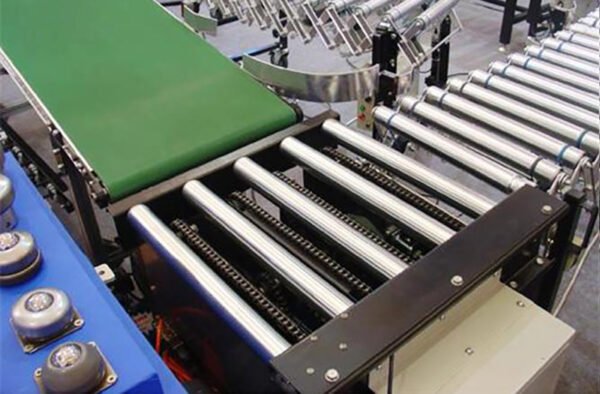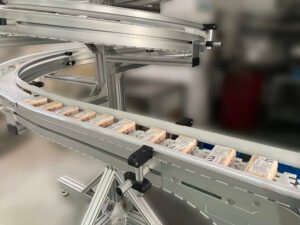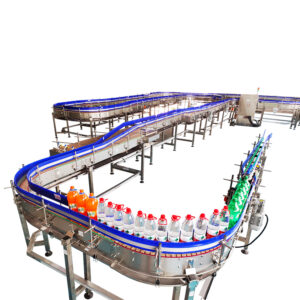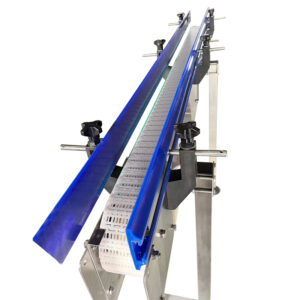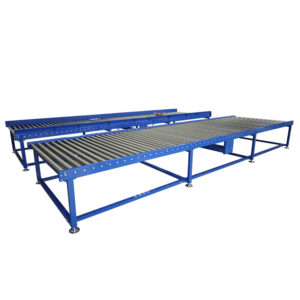If you’ve ever taken a peek behind the scenes of a bustling food production facility, one thing that might have caught your eye is the vast network of conveyor belts. These intricate systems are the unsung heroes of food production. So, why are they so indispensable? To answer this, let’s break down the conveyors’ role piece by piece.

What is a Conveyor System?
A conveyor system, in the simplest terms, is a mechanical apparatus that transports materials from one location to another within a facility. Think of it as the bloodstream of the factory, continually moving goods along the production line.
Why are Conveyors Used in Food Production?
Conveyors are deployed in food production for a host of reasons. They offer precision, speed, and consistency, which are vital ingredients in the recipe for efficiency.
Driving Efficiency in Food Production: The Essential Role of Conveyors
The role of conveyors in driving efficiency in food production cannot be overstated. From swift transportation to meticulous quality checks, their impact is felt at every stage of production.
The Efficiency Factor
Conveyors can dramatically enhance production efficiency. They move at a consistent pace, reducing the probability of human error and ensuring the continuity of the production process.

The Dynamics of Conveyor Systems
A conveyor system is not just a plain, dull assembly of belts and rollers. It’s a dynamic entity, tailored to meet specific production needs.
Customization and Flexibility
The design of a conveyor system can be custom-fitted to match the production demands. This flexibility allows the system to adapt to a wide range of product types and sizes.
Automation and Integration
Conveyors can be seamlessly integrated with other automated systems, ensuring a smooth flow from one process to another. This integration drives efficiency by reducing downtime and human intervention.
Streamlining Operations with Conveyors
Conveyors streamline operations by acting as a bridge between different phases of food production. From raw material handling to packaging, they’re instrumental in maintaining a seamless workflow.
Material Handling
Conveyors eliminate the need for manual material handling, which not only reduces labor costs but also minimizes the risk of injuries.
Seamless Packaging
In the final stages of production, conveyors ensure efficient packaging by accurately aligning products, facilitating quick and precise packing.

Conveyors: The Backbone of Quality Control
Quality control is a critical aspect of food production, and conveyors play a pivotal role in maintaining it.
Inspection and Sorting
Conveyors make it possible to inspect and sort products on the fly, identifying and removing any sub-standard items without disrupting the production flow.
Consistency and Uniformity
Mass Production and Conveyors: A Symbiotic Relationship
By maintaining a constant speed and reducing human interference, conveyors ensure the consistency and uniformity of the products.
Mass production is the heart of the modern food industry. At the heart of mass production lies the conveyor system.
Scaling Up Production
Conveyors make it feasible to scale up production without a proportionate increase in labor or space requirements.
Reducing Production Time
By operating non-stop and at a steady pace, conveyors significantly cut down production time, enabling the output of large quantities in a short period.

Maintaining Hygiene with Conveyors
In food production, hygiene is paramount. Conveyors contribute to maintaining hygienic conditions by minimizing human contact and facilitating easy cleaning.
Reducing Contamination Risks
With less human intervention, the risk of contamination decreases. This ensures that the food produced is safe and clean.
Ease of Cleaning
Most conveyor systems are designed for easy cleaning, a feature that becomes crucial in maintaining hygiene in food production facilities.
The Future of Conveyors in Food Production
While conveyors are already integral to food production, their importance is set to grow in the future.
Advent of Smart Conveyors
Smart conveyors, equipped with sensors and AI technology, are beginning to emerge. These systems can monitor their performance, predict maintenance needs, and even self-adjust to accommodate different products.
Increasing Automation
As automation continues to evolve, conveyors will play a more significant role in fully automated food production lines, driving efficiency to new heights.

FAQs
- Why are conveyors used in food production?
- Conveyors are used in food production because they improve efficiency, maintain quality control, facilitate mass production, and help maintain hygiene.
- How do conveyors improve efficiency?
- Conveyors improve efficiency by providing consistent transportation, reducing human error, and ensuring seamless integration with other automated systems.
- How do conveyors contribute to quality control?
- Conveyors contribute to quality control by enabling on-the-fly inspection, sorting, and ensuring product consistency and uniformity.
- How do conveyors facilitate mass production?
- Conveyors facilitate mass production by enabling scaling up of production without a proportionate increase in labor or space, and by significantly reducing production time.
- How do conveyors help maintain hygiene in food production?
- Conveyors help maintain hygiene by reducing human contact, thus minimizing contamination risks, and by being designed for easy cleaning.
- What is the future of conveyors in food production?
- The future of conveyors in food production includes the advent of smart conveyors with AI technology and increasing automation.

Conclusion
In conclusion, the essential role of conveyors in driving efficiency in food production is unmistakable. They’re not just about moving things around. They are integral components of the production process, responsible for streamlining operations, ensuring quality control, enabling mass production, and maintaining hygiene. As the food industry continues to evolve, so will the role of conveyors, promising a future of even greater efficiency and productivity.



